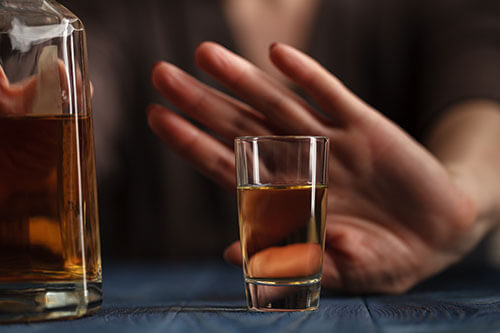Arizona Alcohol Rehab Program
Alcoholism Treatment With Accredited Resources
Many people here in Scottsdale have—or know someone struggling with—alcohol addiction issues. That is not surprising when you consider the availability, association with a good time, and that it’s legal, so there is an implied assumption it must not be harmful. Not so fast.

In the 2018 survey, 9.52% of Arizona residents reported using illicit drugs in the past month, nearly 1% higher than the national average
Alcohol: Know the Facts
- Alcohol is the third leading cause of preventable deaths in the country, according to the National Institute on Alcohol Abuse and Alcoholism.
- Fifteen million U.S. adults have alcohol use disorder.
- Arizona ranks 21 in the country for excessive alcohol use, with 17.2% of adults reporting excessive alcohol use, according to America’s Health Rankings.
- Alcohol addiction is treatable, which is why alcohol rehabilitation programs exist to serve Arizona residents.
You can think of many so-called obstacles but let’s examine the benefits:
- My family life is suffering and I need to make a big lifestyle change.
- My daughter will be graduating soon and I want to be present in mind as well as body during her senior year, not cooped up alone with my depression and a bottle in the bedroom.
- My company is paying towards this through our employee assistance program because they believe in my talents.
- My friend Derrick’s wife got better here and has been sober for two years. Her grandkids are allowed to visit again.
What Is Alcohol Use Disorder?
Alcoholism is a severe form of alcohol use disorder in which a person becomes incapable of controlling their alcohol intake, even when mounting issues like health problems, legal issues, problems at work or school, and disintegrating family relationships present themselves. Activities eventually taper off and a person may become isolated to focus on his/her drinking.

People with alcohol use disorder struggle to contain their drinking due to the physical and psychological relationship they develop with drinking. Physically, it initially stimulates a pleasure center in the brain and psychologically, people associate alcohol consumption in many different ways.
Maybe it was curiosity. Perhaps throughout someone’s young life, they saw a lot of celebrating with alcohol and learned it was needed for a good time. Maybe they turned to alcohol to cope with stress, which can be a sign of a co-occurring disorder that needs treatment as well.
An alcohol rehab center will teach the thinking and behavioral tools that can assist someone in recovery.
The Disease Model is the course that most people with alcoholism follow. This model includes five stages of alcoholism.
These stages are:
- Early alcoholism
- Middle alcoholism
- Late alcoholism
- Treatment
- Relapse
These stages are based on the knowledge that alcoholism is a disease and like any disease, alcoholism has symptoms, causes, and treatment methods. Alcoholism is like any other relapsing disease in its nature. Some other types of diseases include diabetes, asthma, or heart disease. Because of this, most professionals suggest that alcoholics receive alcohol addiction treatment for their disease in an alcohol rehab center. Without treatment, further physical harm can occur as alcohol use progresses.
Approaching alcohol treatment or alcohol rehab is the same as a diabetic knowing sugar isn’t good for them. That diabetic must choose to adopt the life skills that they need to help them enjoy good health without consuming sugar. They must keep on top of their health condition and be aware that relapse can potentially cost them their own life. Although alcohol is a different substance, the disease cycle is the same.
Early or Adaptive Stage
During the first stage of alcoholism, you develop alcohol tolerance. Your body starts to physically adapt to having alcohol in its system, but there aren’t any visible physical signs of alcoholism yet.
Middle Stage
The middle stage includes destructive alcohol use when you no longer feel pleasure from alcohol. At this point, you may drink to “forget” problems that your alcoholism has caused. The body becomes dependent on alcohol and cravings and withdrawal kick in not long after drinking stops. Blackouts start to occur and your drinking may cause major problems at work.
Late Stage
Alcohol begins to wreak havoc on the body. During late-stage alcoholism, you’ll likely feel sick much of the time as a result of a suppressed immune system. Vital organs suffer damage and mental instability may begin to take over. Despite all of these problems, an alcoholic in this stage exercises an extreme denial of their problem.
Scottsdale Alcoholism Rehabilitation Center
Once the person suffering an alcohol addiction breaks through their denial, they can seek treatment. Although an individual can seek an addiction treatment center during any stage of alcoholism, getting help becomes a life-or-death situation in late-stage alcoholism.
Relapse
Relapse used to be considered a “failure.” Now, however, researchers know that alcoholism relapse is like a relapse for just about any other disease. When relapse occurs it can show the alcoholic that they need to maintain a greater watch over their health and sobriety. Many people relapse early in recovery and then never relapse again.
If you feel that you or a loved one may have an unhealthy relationship with alcohol, it is important to be educated on the signs and symptoms to quickly and effectively recognize the issue, as successful treatment of any medical condition first requires a correct diagnosis.
One of the biggest issues with recognizing alcoholism— especially in yourself or a close friend or family member— is the significant negative stigma which is associated with alcoholism, which unfortunately can delay someone’s treatment for an extended time. As we have pointed out, alcohol use disorder is widespread across the country and affects all demographics.
Here Are Common Signs Someone May Have A Drinking Problem:
- Loss of control. This is often the first major sign of alcohol use disorder as the amount that someone drinks can increase quite rapidly, even early in the progression of the disease. This can present itself in the form of binge drinking, in which a person drinks excessive amounts of alcohol, even if it is only occasionally. It can also come in the form of daily drinking, even if it is only a little bit every day.
- Craving alcohol. Another early sign of alcoholism is craving it at often inappropriate times. While it may not be abnormal for someone to want to have a beer with dinner or at a party, craving alcohol in the mornings or while working are warning signs that someone may be developing—or already have—an unhealthy relationship with alcohol.
- Placing alcohol over other responsibilities. As the disease of alcoholism progresses, drinking will become more important to the individual and many times it becomes more important than work, family, and friends.
- Blacking out. Blacking out due to excessive drinking is not particularly common for those who have normal relationships with alcohol. Drinking to such excess that it causes you to black out and forget time is a very strong warning sign that the drinking has gotten out of control.
- Experiencing withdrawal symptoms. When someone is such a heavy drinker that they are unable to physically function without it due to withdrawal symptoms like shakiness and nausea, alcohol use should be evaluated.
- Severe health issues. Significant health issues may have already started to occur but their symptoms are not present until permanent physical damage has been made internally. This can be devastating, permanent, and oftentimes fatal. Things like liver failure can be common in those who drink heavily for many years, which is why catching earlier symptoms is so crucial to avoid these serious health problems.
Alchohol Rehab Center in Scottsdale, Arizona
Let the team at our Scottsdale alcohol rehab center guide your journey.
These symptoms are some of the most common, however, they are not the only potential signs. Many alcoholics will not display all of these symptoms, but even one of them is a strong indicator that a drinking problem may be present and treatment at a specialized alcohol rehab is necessary.
What is important to consider is that many individuals and families tend to brush drinking problems under the rug, blaming them for stress or depression. While these are two very common causes for someone to begin drinking, they are no excuse to leave a drinking problem untreated.
Unfortunately, once the disease has progressed to a certain point, even removing stress or depression may not be able to stop someone’s drinking.
What Is Rehab & Detox?
Just like choosing a home or a college, before you make a life decision you probably put a lot of time and thought into researching details before you feel comfortable with your decision.
When the decision involves life in the balance due to alcohol use disorder, finding the right treatment center is of heightened importance.
Pinnacle Peak Recovery is transparent in this process to make sure you find a quality and reputable program which is right for you or your loved one. Alcoholism and drinking problems can be a significant problem for some people, causing a real and negative impact on their quality of life. The good news is that there is help available to recover and get your life back.
Pinnacle Peak Recovery offers several individualized treatment programs, using multiple forms of therapy that blend the traditional and cutting-edge treatment models to make sure that the best possible care is provided.

Some of the forms of treatment that we offer in our alcohol rehab programs are:
- Cognitive behavioral therapy
- Dialectic behavioral therapy
- Dual Diagnosis treatment
- Holistic Treatment
- Individual Therapy
- Experiential Therapy
Our philosophy is that every single client can benefit from an individualized treatment program that is designed specifically to address their needs and struggles.
We have found that these individualized programs have allowed our clients not only to enjoy their treatment more but place them in a better position to succeed in the long run.
One of our valued therapists described people as either being very quiet or very talkative during their assessments for a variety of reasons.
“Most people are somewhat scared and have lowered self-esteem. They might be a little loud because their adrenaline is pumping from the new environment or nearly mute because they don’t know who they’re about to meet.
We want them to know they’re going to see friendly faces and people who look like them. We have a lot of diversity, all different races, and ages. If you make a mistake, you’re not going to be judged or punished. That’s not why you came here.”
She adds this important thought:

Pinnacle Peak Recovery in Scottsdale, is just such an example of quality addiction treatment near you. We are accredited by the Joint Commission, reflecting the rehab center's dedication to quality in treatment provision and results. The Joint Commission evaluates health care organizations and programs for compliance with the highest national standards for safety and quality of care and commitment to continually improving patient care.
Pinnacle Peak Recovery believes in clinical excellence and compassionate care, and our family-feel approach offers a special environment for our clients to find recovery.
We incorporate the 12 Steps into our approach but rely heavily on evidence-based therapy treatments. We also work with those on medication when needed.
We know that the longer a client is connected to care, the better their chance of success, so we work hard to maintain contact with our clients post-discharge.

How Long Does Inpatient Rehab Last?
Time in drug rehabilitation treatment often depends on you. Are you engaged in treatment? Have you and your loved ones worked with the family therapist? Are you reaching your treatment goals? Do you truly seem motivated to change? These factors all contribute to your length of stay.
Some inpatient programs last a few weeks. For other people, more extensive treatment is necessary. Recovery isn’t one-size-fits-all. Your drug history, support network, and progress through treatment play an important role in the length of your treatment.
Of course, this time is an investment in your future. It’s a relatively short time in your life when you can finally face your challenges and get the support you may never have had a chance to experience. Embrace it.
Pinnacle Peak Recovery is here for you as you or your loved one pursue inpatient treatment for a new way of life. Call us today at 833-750-1742 and let us welcome you through our healing door.
Since opening our treatment homes four years ago, Pinnacle Peak Recovery has helped hundreds of people seeking alcohol and drug treatment. We have an active alumni group and are excited about the high rate of continued success our alumni have achieved.
Levels of Alcohol Rehabilitation Health Care at a Glance
- Medical Detox in a safe environment with medical supervision occurs over five to 10 days.
- Inpatient generally lasts between two weeks to 30 days.
- Transition to partial hospitalization care (PHP) lasting approximately 45 days (clients can either return home or stay at a sober living home nearby; a new 8-person male PHP home recently opened this summer showing our continued growth of services we provide).
- Intensive Outpatient Care (IOP) is held three evenings weekly and the program lasts 60 days.
Treatment Center Admissions Process
In addition to providing the best alcohol rehab treatment in Arizona, we strive to make the admissions process as quick and as simple as possible. Call us today to get the drug rehab treatment that you or your loved one deserve. There is no need to fight drug addiction and alcoholism alone.
We have an experienced team of professionals available 24/7 to assess the situation and help guide you through the admissions process to make sure that you get help as quickly as possible. Contact us today at 833-487-0804.
Call Our Beautiful Arizona Alcohol Rehab Center Today!
Detox Recovery in Scottsdale
Alcohol use disorder often leads to physical dependence which can create withdrawal symptoms for someone who tries to stop drinking on their own. Some of these symptoms, like seizures and delirium tremens, can be serious and potentially life-threatening.
Many people who enter rehab require a medical alcohol detox to safely stop drinking. Patients are under close medical supervision and are usually treated with a combination of medications to keep them safe and comfortable. This process typically lasts between five and 10 days. Once they are medically stable, it is strongly suggested that they continue their treatment with an inpatient or outpatient alcohol rehab program as recommended by their intake counselor.
Inpatient Alcohol Rehab Centers
Inpatient rehab for alcohol use disorder is typically the most effective form of treatment. Inpatient treatment involves the patient living at a fully-staffed facility that offers a wide range of daily treatment including one-on-one therapy and group therapy with licensed professionals.
A structured daily schedule combined with an intensive treatment regimen is what makes inpatient rehab the most effective form of treatment for most people. This form of treatment is so effective because it allows an individual to step away from the life circumstances that were contributing to their drinking and learn effective coping mechanisms and tools before returning to their everyday life. Upon completing an inpatient alcohol rehab program, it is typically recommended that the patient transition to an outpatient program.
Outpatient Alcoholism Treatment Center
Outpatient alcohol rehab is a treatment that is done in an office setting during specified days and times while the patient lives either at home or in a sober living environment. While most outpatient programs in the Phoenix, Arizona area offer a combination of individual and group therapy, they offer much less structure than inpatient programs.
Outpatient programs are most effective for those who have just completed an inpatient program or have life circumstances such as children or a job that prevent them from entering inpatient treatment. These programs are run by licensed professionals three evenings weekly.
Call Pinnacle Peak for Help With Alcohol Rehab in Scottsdale
As you read and learn more about alcohol use disorder and treatment, we want you to know Pinnacle Peak Recovery can help. Getting yourself or your loved one into treatment as soon as you recognize these signs of alcohol use disorder is important and our doors are always open.

What Our Valued Patients Say
Frequently Asked Questions About Alcohol Addiction Recovery
How Long Is Rehab For Alcohol?
Alcohol detox typically lasts between five to 10 days and should be followed by a care plan developed by an assessment coordinator after a patient interview. Care plans involve inpatient rehab, partial hospitalization program, intensive outpatient program, and recovery. Recovery support for maintenance to avoid relapse is highly recommended.
The length of time for any program will be determined by the alcohol treatment center and the patient’s program participation.
How Much Does Alcohol Rehab Cost?
There are many variables involved in estimating a patient’s cost for alcohol use disorder treatment and a dollar amount cannot be established until the variables are applied. They include the availability of programs in the region, amenities offered, income levels, treatment for military veterans, insurance plans, and available grants and scholarships.
Alcoholics Anonymous is a worldwide organization that provides free support for millions who have been helped by its 12-step program since 1935.
What Happens in Alcohol Rehab?
Alcohol rehab programs may vary slightly, but the vast majority of inpatient programs provide detox treatment followed by alcohol use disorder treatment. These programs are mostly run by licensed therapists who use cognitive behavioral therapy to introduce new thought processes surrounding alcohol.
There are other therapies such as individual and family counseling or learning new practices like yoga and meditation to help effectively manage stress and anxiety. Establishing new social and other life skills help transition to a recovery program and are key to avoid relapse.
How Can I Stop Drinking Without Alcohol Rehab and Therapy?
Many community programs have alcohol support groups from LGBTQ-friendly to faith-centered to self-motivational programs and can be found in-person and online. Establishing connections with others who maintain a sober lifestyle and reducing your exposure to social settings that acted as triggers for your drinking are also helpful tools. Many people find a sponsor they turn to for support when they feel an urge to return to alcohol.
